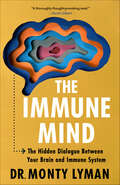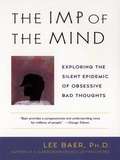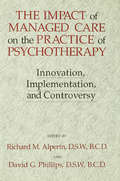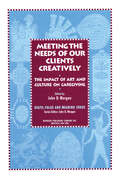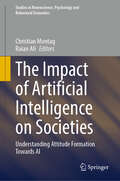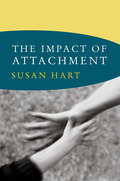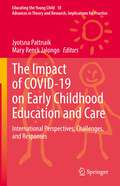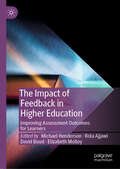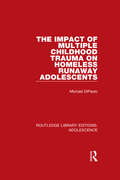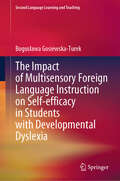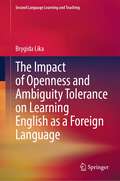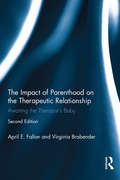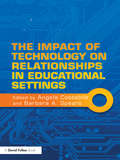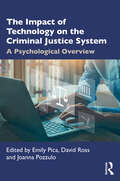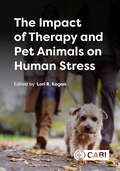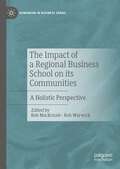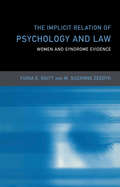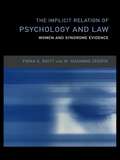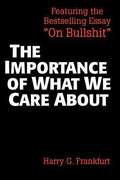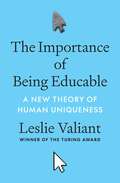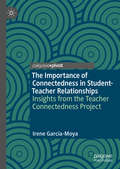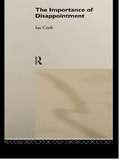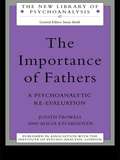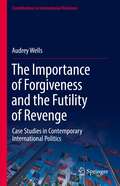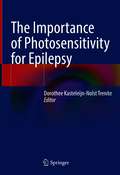- Table View
- List View
The Immune Mind: The Hidden Dialogue Between Your Brain and Immune System
by Monty LymanDelving into the recent discovery of the brain's immune system, Dr. Monty Lyman reveals the extraordinary implications for our physical and mental health.Until a decade ago, we misunderstood a fundamental aspect of human health. Although the brain and the body have always been viewed as separate entities—treated in separate hospitals—science now shows that they are intimately linked.Startlingly, we now know that our immune system is in constant communication with our brain and can directly alter our mental health. This has opened up a new frontier in medicine. Could inflammation cause depression, and could arthritis drugs cure it? Can gut microbes alter your mood? Can something as simple as brushing your teeth properly reduce your risk of dementia? Could childhood infections lie behind neurological and psychiatric disorders such as tics and obsessive compulsive disorder?In The Immune Mind, Dr. Monty Lyman explores the fascinating connection between the mind, immune system, and microbiome. A specialist in the cutting-edge field of immuno-psychiatry, Lyman argues that we need to change the way we treat disease and the way we see ourselves. For the first time, we have a new approach to medicine that treats the whole human being.
The Imp of the Mind
by Lee BaerIn The Imp of the Mind, a leading expert on Obsessive Compulsive Disorder explores the hidden epidemic that afflicts millions of Americans. In the first book to fully examine obsessive bad thoughts, Dr. Lee Baer combines the latest research with his own extensive experience in treating this widespread syndrome. Drawing on information ranging from new advances in brain technology to pervasive social taboos, Dr. Baer explores the root causes of bad thoughts, why they can spiral out of control, and how to recognize the crucial difference between harmless and dangerous bad thoughts. An illuminating and accessible guide to the kinds of thoughts that create extreme fear, guilt, and worry, The Imp of the Mind provides concrete solutions to a tormenting and debilitating disorder. Including special sections on the prescription medications that have proven effective, it is "a beautifully written book that can be a great help to people who want to know what to do about obsessions" (Isaac Marks, M. D. , author of Living with Fear: Understanding and Coping with Anxiety). .
The Impact Of Managed Care On The Practice Of Psychotherapy: Innovations, Implementation And Controversy
by Richard M. Alperin David G. PhillipsPublished in 1996, The Impact Of Managed Care On The Practice Of Psychotherapy is a valuable contribution to the field of Psychotherapy.
The Impact of Art and Culture on Caregiving: The Impact of Art and Culture on Caregiving (Death, Value and Meaning Series)
by John D Morgan"Meeting the Needs of Our Clients Creatively: The Impact of Art and Culture on Caregiving" is an important new work which integrates traditional understandings of care of the dying and bereaved with the use of arts and other forms of cultural creativity in therapy and funeralization. Twenty-one authors give us cutting-edge insights into the practical aspects of caring for the dying and bereaved as well as new understandings of creativity.
The Impact of Artificial Intelligence on Societies: Understanding Attitude Formation Towards AI (Studies in Neuroscience, Psychology and Behavioral Economics)
by Christian Montag Raian AliThis book presents a recent framework proposed to understand how attitudes towards artificial intelligence are formed. It describes how the interplay between different variables, such as the modality of AI interaction, the user personality and culture, the type of AI applications (e.g. in the realm of education, medicine, transportation, among others), and the transparency and explainability of AI systems contributes to understand how user's acceptance or a negative attitude towards AI develops. Gathering chapters from leading researchers with different backgrounds, this book offers a timely snapshot on factors that will be influencing the impact of artificial intelligence on societies. Chapter 12 is available open access under a Creative Commons Attribution 4.0 International License via link.springer.com.
The Impact of Attachment (Norton Series on Interpersonal Neurobiology)
by Susan HartHow early infant-parent interactions can explain adult social and emotional relationships. Combining theories of neurobiology, interpersonal relationships, and intrapsychic concepts, this book explores the importance of attachment. Hart addresses children's normal development and relational disorders and presents an integrated therapeutic approach that takes attachment issues into consideration. Complex neurobiological and behavioral theory are transformed into protocols that can be easily implemented by the practicing clinician.
The Impact of COVID-19 on Early Childhood Education and Care: International Perspectives, Challenges, and Responses (Educating the Young Child #18)
by Mary Renck Jalongo Jyotsna PattnaikThis collection brings together a diverse group of scholars from throughout the world who have grappled with and investigated the impact of the COVID-19 crisis on the lives of young children. Profound changes have occurred in all facets of early childhood education and care (ECEC). Young children and their families, college students enrolled in teacher preparation programs, inservice teachers/caregivers, and postsecondary faculty have endured prolonged periods of quarantine, disruption, stress, and grief precipitated by the pandemic. These consequences have been even more challenging for individuals and groups who were already struggling or marginalized prior to the advent of the coronavirus. Collectively, the chapter authors draw upon findings from their research and insights gleaned from professional experiences to recommend ways of providing high-quality programs despite persistent global health threats.
The Impact of Feedback in Higher Education: Improving Assessment Outcomes for Learners
by Michael Henderson David Boud Rola Ajjawi Elizabeth MolloyThis book asks how we might conceptualise, design for and evaluate the impact of feedback in higher education. Ultimately, the purpose of feedback is to improve what students can do: therefore, effective feedback must have impact. Students need to be actively engaged in seeking, sense-making and acting upon any information provided to them in order to develop and improve. Feedback can thus be understood as not just the giving of information, but as a complex process integral to teaching and learning in which both teachers and students have an important role to play. The editors challenge us to ask two fundamental questions: when does feedback make a difference, and how can we recognise that impact? This volume draws together leading international researchers across diverse disciplines, offering promising directions for both research and practice.
The Impact of Multiple Childhood Trauma on Homeless Runaway Adolescents (Routledge Library Editions: Adolescence #2)
by Michael DiPaoloOriginally published in 1999, the author addresses the American tragedy of some two million youth running away from home each year. This title proposes a model for examining the relationship between multiple types of childhood trauma – physical, sexual and psychological abuse, exposure to domestic violence – and psychological functioning in a sample of 140 homeless adolescents.
The Impact of Multisensory Foreign Language Instruction on Self-efficacy in Students with Developmental Dyslexia (Second Language Learning and Teaching)
by Bogusława Gosiewska-TurekThis book investigates the effect of multisensory instruction on self-efficacy among students with developmental dyslexia learning English as a foreign language. The first three chapters of the book delve into theoretical aspects of developmental dyslexia, multisensory instruction, and self-efficacy, providing an overview of existing research in this domain. The second part of the book reports empirical findings obtained from a case study supplemented by quantitative analysis. These findings highlight the advantages of employing multisensory instructional techniques for teaching foreign languages to students with dyslexia. Notably, the application of multisensory instruction not only enhances dyslexic students’ foreign language competencies but also positively impacts their self-efficacy. The study underscores the importance of language instruction tailored to the special educational needs of students with dyslexia as well as its potential to foster self-efficacy, an essential factor for success in foreign language learning.
The Impact of Openness and Ambiguity Tolerance on Learning English as a Foreign Language (Second Language Learning and Teaching)
by Brygida LikaThis book highlights the importance of individual learner differences in learning English as a foreign language and reports the findings of a study which investigated the impact of two personality traits, which are, openness to experience and ambiguity tolerance, on target language attainment among Polish secondary school students. The book provides an exhaustive overview of the theoretical issues and existing research related to personality, emphasizing the two traits under investigation, openness, and ambiguity tolerance, which are the focus of the empirical study reported later in the book. The empirical investigation explored relationships between openness to experience and ambiguity tolerance, as well as their impact on attainment in learning English as a foreign language. Moreover, it also aimed to shed light on the link between these traits and students’ assessments (i.e., self-assessment and school grades). The findings of the study provide a basis for proposing specific profiles of foreign language learners with different levels of openness and ambiguity tolerance.
The Impact of Parenthood on the Therapeutic Relationship: Awaiting the Therapist's Baby
by April E. Fallon Virginia BrabenderThis volume covers the range of reactions that both patients and clients have to the circumstance of a child entering the therapist’s family. Through research, the authors show these reactions can be extremely powerful, and when fully explored can be used to advance the therapy and the development of the patient. Rich clinical illustrations are provided throughout the text. In addition, the reader is offered many therapeutic strategies for working with patient-therapist reactions as they unfold. Many practical issues arise in conjunction with this life transition. Examples include announcing a pregnancy or an imminent adoption, planning parental leave and covering the patient’s needs during the hiatus. In this second edition, therapists who are members of LGBT families and single parent families are described in terms of their special needs, challenges and resources. This updated edition also contains a new chapter on special problems that can arise during pregnancy.
The Impact of Technology on Relationships in Educational Settings
by Barbara A. Spears Angela CostabileAs the linguistic, cognitive and social elements of our lives are transformed by new and emerging technologies, educational settings are also challenged to respond to the issues that have arisen as a consequence. This book focuses on that challenge: using psychological theory as a lens to highlight the positive uses of new technologies in relationships and educational settings, and to advocate technological learning opportunities and social support where the misuse and abuse of ICT occurs. The Impact of Technology on Relationships in Educational Settings sets out to explore the role of ICTs in relationship forming, social networking and social relationships within our schools and has grown out of the European Cooperation in Science and Technology (COST); Action on cyberbullying, involving 28 participating countries, and two non-COST countries, of which Australia is one. This cutting edge international text offers cross-cultural, psychological perspectives on the positive uses of new and emerging technologies to improve social relationships and examples of best practice to prevent virtual bullying. This comes at a time when much of the focus in current writings has been on the more negative aspects which have emerged as new technologies evolved: cyberbullying, cyber-aggression and cybersafety concerns. This text is ideally suited to researchers and practiitioners in the fields of Educational and developmental psychology, as well as those specialising in educational technology and the sociology of education.
The Impact of Technology on the Criminal Justice System: A Psychological Overview
by David Ross Joanna Pozzulo Emily PicaThis comprehensive volume explores the impact of emerging technologies designed to fight crime and terrorism. It first reviews the latest advances in detecting deception, interrogation, and crime scene investigation, before then transitioning to the role of technology in collecting and evaluating evidence from lay witnesses, police body cameras, and super-recognizers. Finally it explores the role of technology in the courtroom with a particular focus social media, citizen crime sleuths, virtual court, and child witnesses. It shines light on emerging issues, such as whether new norms have been created in the emergence of new technologies and how human behaviour has shifted in response. Based on a global range of contributions, this volume provides an overview of the technological explosion in the field of law enforcement and discusses its successes and failures in fighting crime. It is valuable reading for advanced students in forensic or legal psychology and for practitioners, researchers, and scholars in law, criminal justice, and criminology.
The Impact of Therapy and Pet Animals on Human Stress
by Paul J. Zak A. Alexander Beaujean Jeffrey R. Stevens John-Tyler Binfet Roger N. Reeb Brianne Donaldson David M. Feldman Aliya Khalid Abigail Alfrey Ariann E. Robino Alyssa N. Stein Melody A. Schmaltz Hailey A. Fitzpatrick Jaime L. Tartar Frankie Pizzo Marah Friedman Olivia Feldman Rafael Martos-Montes David Ordóñez-Pérez Jesús Ruiz-Maatallah Miriam Martínez-Cobos Elise R. Thayer Jonathan B. Banks Caitlin McCoy Courtney Trzcinski Nicole L. Beasley Greg C. Elvers Hannah L. Torok Patricia Pendry Alexa M. Carr Stephanie M. Roeter Jaymie L. Vandagriff Saadia Dildar Benjamin A. Curry Moana Vercoe Matthew Filippo Karen Manville Mark Coulson Michele A. Mulqueen Kirsty Neller Caroline Searing Sarah Welland Gemma Reynolds Freya L.L. Green Rebecca J.P. Godard Madisyn M. Szypula Camille X. Rousseau Jordy Decker Beth A. Lanning Amelia L. Wilson Robert Woelk Lauren Highfill Miranda Goodman-Wilson Mónica Teresa González-Ramírez René Landero-Hernández Minerva Vanegas-FarfanoStress can have a deleterious effect on people's mental, physical, and psychological health. There is a growing body of evidence, however, that suggests animals, both as pets and therapy partners, can help mitigate people's stress levels. This book showcases a rich collection of research papers from Human-Animal Interactions. It highlights research pertaining to pets as well as animal-assisted therapy in both school and professional settings. The book also includes a scene-setting introduction and wrap-up conclusion from the editor. Providing comprehensive information on the impact of animals on human stress, this book is a useful resource for anyone interested in human health or human-animal relationships.
The Impact of a Regional Business School on its Communities: A Holistic Perspective (Humanism in Business Series)
by Bob MacKenzie Rob WarwickThe place and impact of large, elite business schools is hotly debated. Compared to such establishments, little has been written about smaller, regional, community-oriented business schools that serve and interact with their various communities at home or abroad.Focusing on one of the smaller regional business schools in the UK, and incorporating perspectives from further afield, this book seeks to redress that balance. This local focus enables a more holistic understanding of what really goes on in terms of the complex relationships, practices, challenges and contexts at play in such an arena. The book, conceived throughout the Covid-19 pandemic, reverberates with a multiplicity of voices, perspectives and narratives, and reflects a process of collaborative autoethnography and critical friendship. It will be of great value to academics, students and others who are interested in optimising the benefits of regional business schools around the world.
The Implicit Relation of Psychology and Law: Women and Syndrome Evidence
by Suzanne Zeedyk Fiona RaittThe Implicit Relation of Psychology and Law brings an innovative, feminist analysis to these affiliated fields. In addition to the explicit relationship between the two fields, they argue that there is an unrecognised implicit relation existing within the intersection of psychology and law which they find works to the disadvantage of women.
The Implicit Relation of Psychology and Law: Women and Syndrome Evidence (Critical Psychology Ser.)
by Suzanne Zeedyk Fiona RaittFrom a feminist perspective, the authors critically review the current use of psychology in law and identify a powerful collusion between the two fields which works actively against the interests of women. They provide support for their argument in such areas as child abuse, domestic violence, rape and abortion.This groundbreaking international text draws on both research findings and case material from various countries including Australia, New Zealand, Canada and South Africa as well as the USA and Great Britain.The Implicit Relation of Psychology and Law brings an innovative, feminist analysis to these affiliated fields. Fiona E. Raitt and M. Suzanne Zeedyk explore the role of psychological syndromes (i.e. Battered Woman's Syndrome, Rape Trauma Syndrome, Pre-menstrual Syndrome and False Memory Syndrome) within the courtrooms of the UK and the US. In addition to the explicit relationship between the two fields, they argue that there is an unrecognised implicit relation existing within the intersection of psychology and law, which they find works to the disadvantage of women.Both novel and controversial and written in an accessible style, The Implicit Relation of Psychology and Law will engage readers from a wide range of disciplines including: psychology, law, critical theory, criminology and women's studies.
The Importance Of What We Care About: Philosophical Essays
by Harry G. FrankfurtThis volume is a collection of thirteen seminal essays on ethics, free will, and the philosophy of mind. The essays deal with such central topics as freedom of the will, moral responsibility, the concept of a person, the structure of the will, the nature of action, the constitution of the self, and the theory of personal ideals. By focusing on the distinctive nature of human freedom, Professor Frankfurt is ale to explore fundamental problems of what it is to be a person and of what one should care about in life.
The Importance of Being Educable: A New Theory of Human Uniqueness
by Leslie ValiantIn the age of AI, why our future depends on better understanding what makes us humanWe are at a crossroads in history. If we hope to share our planet successfully with one another and the AI systems we are creating, we must reflect on who we are, how we got here, and where we are heading. The Importance of Being Educable puts forward a provocative new exploration of the extraordinary facility of humans to absorb and apply knowledge. The remarkable &“educability&” of the human brain can be understood as an information processing ability. It sets our species apart, enables the civilization we have, and gives us the power and potential to set our planet on a steady course. Yet it comes hand in hand with an insidious weakness. While we can readily absorb entire systems of thought about worlds of experience beyond our own, we struggle to judge correctly what information we should trust.In this visionary book, Leslie Valiant argues that understanding the nature of our own educability is crucial to safeguarding our future. After breaking down how we process information to learn and apply knowledge, and drawing comparisons with other animals and AI systems, he explains why education should be humankind&’s central preoccupation.Will the unique capability that has been so foundational to our achievements and civilization continue to drive our progress, or will we fall victim to our vulnerabilities? If we want to play to our species&’ great strength and protect our collective future, we must better understand and prioritize the vital importance of being educable. This book provides a road map.
The Importance of Connectedness in Student-Teacher Relationships: Insights from the Teacher Connectedness Project
by Irene García-MoyaThis book argues for the importance of connectedness in student-teacher relationships during adolescence and advocates a more holistic and proactive approach to wellbeing in education. Combining education, psychology and health promotion perspectives, the book begins by providing an overview of theoretical frameworks in the study of student-teacher relationships and makes the case that good relationships with teachers are essential to students’ well-being in school. The book then goes on to present the concept of connectedness and discusses the main challenges regarding its conceptualisation in school research. García-Moya draws on qualitative findings from the Teacher Connectedness Project to offer an in-depth examination of the central attributes of student-teacher connectedness, as well as of the links between connectedness and authority from both students’ and teachers’ perspectives. This innovative project uses a synergistic approach to investigate the role of teachers as potential significant adults in students’ lives. The final chapter offers a summary of the key practical implications for teachers and educators and makes recommendations for future research directions in this area. This book will be a valuable resource for researchers and educators alike, as well as for anyone interested in the ongoing concerns about student wellbeing in schools.
The Importance of Disappointment
by Ian CraibThis sane and insightful discussion explores the nature of identity in late modern societies to criticize the way in which psychotherapy has become an ideology of late modernity and to emphasize the importance of `negative' messages in psychoanalytic theory.
The Importance of Fathers: A Psychoanalytic Re-evaluation (The New Library of Psychoanalysis #Vol. 42)
by Judith Trowell Alicia EtchegoyenIt is widely acknowledged that children need structure, security, stability and attachment to develop and flourish, and that the father is an important part of this. Issues such as high divorce rates, new family structures, increased mobility, women's liberation and contraception are very common in society. This book sets out to explore what has happened to men and to fathers during all these changes and transitions. Judith Trowell and Alicia Etchegoyen, along with an array of renowned contributors, consider the importance of fathers in various situations, including: the role of the father at different stage of children's development the missing father loss of a father grandfathers. It is argued that the father is important, not only to support the main carer (usually the mother) but also to provide a caring, thinking, comfortable, confident presence.
The Importance of Forgiveness and the Futility of Revenge: Case Studies in Contemporary International Politics (Contributions to International Relations)
by Audrey WellsForgiveness is important in international politics because it can save thousands of lives. Its opposite, vengefulness, has played a significant part in various wars of the 20th and 21st centuries. These conflicts are examined in this book, showing how forgiveness could have avoided the tremendous ensuing bloodshed. Despite its importance, in the context of international relations, forgiveness as a means of preventing the outbreak of war (as opposed to facilitating reconciliation after conflicts) has largely been neglected as a subject of study. Indeed, it has also been ignored by politicians, as a result of which there are few examples of forgiveness to study compared with those of revenge. This book reflects this reality, but also seeks to change it by raising public awareness of the importance of forgiveness in international affairs and the need to demand that political leaders explore this avenue. The book also provides a succinct, informative guide to the background of today’s international affairs. Each chapter can be read independently and highlights either forgiveness in action or the futility and loss of life caused by vengefulness, demonstrating where and how forgiveness could have made a dramatic difference.
The Importance of Photosensitivity for Epilepsy
by Dorothee Kasteleijn-Nolst TreniteThis book offers a detailed account of all aspects of photosensitive epilepsy, including genetic testing, functional imaging (fMRI, MEG), pharmacological studies, animal studies, classification based on the occurrence of photoparoxysmal responses (PPRs) in different epilepsy syndromes, and the available prevention and treatment options. In addition, the comorbidity of and overlap between migraine and epilepsy are discussed. Informative case histories with EEG examples and a helpful glossary are included. In epilepsy, the term photosensitivity is used both for epileptic seizures triggered by flashing or flickering light and for epileptiform discharges evoked by intermittent photic stimulation (IPS) during an EEG recording. Most patients with a clear history of visually induced seizures will show epileptiform EEG discharges during IPS (PPRs). As epileptiform discharges can be evoked in photosensitive patients at any time, without triggering seizures, they can be considered a useful surrogate marker of the necessity and efficacy of epilepsy treatment. This book will serve as an ideal guide to the subject for pediatricians, (pediatric) neurologists, epileptologists, (child) psychiatrists, clinical geneticists, neuropsychologists, neuropharmacologists, occupational therapists, and basic scientists.
